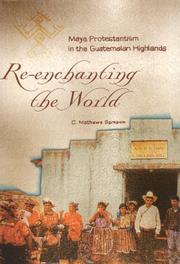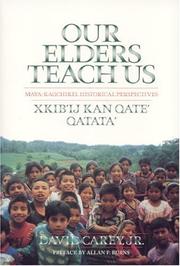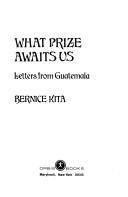| Listing 1 - 4 of 4 |
Sort by
|

ISBN: 0292725302 0292798261 0292725345 Year: 2001 Publisher: Austin, TX : University of Texas Press,
Abstract | Keywords | Export | Availability | Bookmark
 Loading...
Loading...Choose an application
- Reference Manager
- EndNote
- RefWorks (Direct export to RefWorks)
As ideas, goods, and people move with increasing ease and speed across national boundaries and geographic distances, the economic changes and technological advances that enable this globalization are also paradoxically contributing to the balkanization of states, ethnic groups, and special interest movements. Exploring how this process is playing out in Guatemala, this book presents an innovative synthesis of the local and global factors that have led Guatemala's indigenous Maya peoples to assert and defend their cultural identity and distinctiveness within the dominant Hispanic society. Drawing on recent theories from cognitive studies, interpretive ethnography, and political economy, Edward F. Fischer looks at individual Maya activists and local cultures, as well as changing national and international power relations, to understand how ethnic identities are constructed and expressed in the modern world. At the global level, he shows how structural shifts in international relations have opened new venues of ethnic expression for Guatemala's majority Maya population. At the local level, he examines the processes of identity construction in two Kaqchikel Maya towns, Tecpán and Patzún, and shows how divergent local norms result in different conceptions and expressions of Maya-ness, which nonetheless share certain fundamental similarities with the larger pan-Maya project. Tying these levels of analysis together, Fischer argues that open-ended Maya "cultural logics" condition the ways in which Maya individuals (national leaders and rural masses alike) creatively express their identity in a rapidly changing world.
Mayas --- Cakchikel Indians --- Cakchiquel (Indiens) --- Ethnic identity --- Politics and government --- Identité ethnique --- Politique et gouvernement --- Guatemala --- Economic conditions --- Conditions économiques --- Ethnic identity. --- Politics and government. --- Cachiquel Indians --- Cakchiquel Indians --- Kacchiquel Indians --- Kaqchikel Indians --- Indians of Central America --- Quiché Indians --- Maya Indians --- Mayans --- Indians of Mexico

ISBN: 081738104X 9780817381042 9780817315665 0817315667 9780817354275 0817354271 Year: 2007 Publisher: Tuscaloosa : University of Alabama Press,
Abstract | Keywords | Export | Availability | Bookmark
 Loading...
Loading...Choose an application
- Reference Manager
- EndNote
- RefWorks (Direct export to RefWorks)
Christian evangelicals among native people in Latin America. What does it mean to be both Maya and Protestant in Guatemala? Burgeoning religious pluralism in Mesoamerica and throughout Latin America is evident as Protestantism permeates a region that had been overwhelmingly Catholic for nearly five centuries. In considering the interplay between contemporary Protestant practice and native cultural traditions among Maya evangelicals, Samson documents the processes whereby some Maya have converted to new forms of Christianity and the ways in which the Maya are incor
Presbyterian Church --- Indian Presbyterians --- Cakchikel Indians --- Mam Indians --- Christian sects --- Presbyterians --- Cachiquel Indians --- Cakchiquel Indians --- Kacchiquel Indians --- Kaqchikel Indians --- Indians of Central America --- Quiché Indians --- Indians of Mexico --- Mayas --- Social conditions. --- Religion. --- Guatemala --- Gvatemala --- Goatemala --- Republic of Guatemala --- República de Guatemala --- Central America (Federal Republic) --- Social life and customs. --- Religious life and customs.

ISBN: 0817313273 9780817313272 081731119X 9780817311193 Year: 2001 Publisher: Tuscaloosa University of Alabama Press
Abstract | Keywords | Export | Availability | Bookmark
 Loading...
Loading...Choose an application
- Reference Manager
- EndNote
- RefWorks (Direct export to RefWorks)
In this rich and dynamic work, David Carey Jr. provides a new perspective on contemporary Guatemalan history by allowing the indigenous peoples to speak for themselves. Combining the methodologies of anthropology and history, Carey uses both oral interviews and meticulous archival research to construct a history of the last 130 years in Guatemala from the perspective of present-day Mayan people. His research took place over five years, including intensive language study, four summers of fieldwork, and a year-long residence in Comalapa, during which he conducted most of the 414
Oral tradition --- Cakchikel philosophy. --- Cakchikel Indians --- Tradition, Oral --- Oral communication --- Folklore --- Oral history --- Philosophy, Cakchikel --- Philosophy, Guatemalan --- Cachiquel Indians --- Cakchiquel Indians --- Kacchiquel Indians --- Kaqchikel Indians --- Indians of Central America --- Quiché Indians --- Historiography. --- Ethnic identity. --- Guatemala --- Gvatemala --- Goatemala --- Republic of Guatemala --- República de Guatemala --- Central America (Federal Republic) --- Politics and government. --- Ethnic relations. --- History.

ISBN: 0883442736 9780883442739 Year: 1988 Publisher: Maryknoll (N.Y.): Orbis,
Abstract | Keywords | Export | Availability | Bookmark
 Loading...
Loading...Choose an application
- Reference Manager
- EndNote
- RefWorks (Direct export to RefWorks)
Cakchikel Indians --- Indians of Central America --- Persecution --- Missions --- History --- 266 <728.1> --- 27 <728.1> --- 271.77*58 --- Missies. Evangelisatie. Zending--Guatemala --- Kerkgeschiedenis--Guatemala --- Maryknoll --- 271.77*58 Maryknoll --- Cachiquel Indians --- Cakchiquel Indians --- Kacchiquel Indians --- Kaqchikel Indians --- Quiché Indians --- Indigenous peoples --- Meso-America --- Meso-American Indians --- Mesoamerica --- Mesoamerican Indians --- Pre-Columbian Indians --- Precolumbian Indians --- Ethnology --- Christians --- Religious persecution --- Atrocities --- Persecutions --- Kita, Bernice --- Correspondence. --- Maryknoll Sisters --- Teresians --- Sisters of Maryknoll --- Foreign Mission Sisters of St. Dominic --- Congregation of the Maryknoll Sisters of St. Dominic --- Maryknoll Sisters of St. Dominic --- Congregatio Sororum Sancti Dominici de Maryknoll --- O.P. --- OP (Maryknoll Sisters) --- Catholic Foreign Mission Society of America --- Guatemala --- Gvatemala --- Goatemala --- Republic of Guatemala --- República de Guatemala --- Central America (Federal Republic) --- Church history --- Politics and government --- Cakchikel Indians - Missions - History - 20th century --- Indians of Central America - Missions - Guatemala - History - 20th century --- Persecution - Guatemala - History - 20th century --- Kita, Bernice - Correspondence --- Guatemala - Church history - 20th century --- Guatemala - Politics and government - 1945-1985
| Listing 1 - 4 of 4 |
Sort by
|

 Search
Search Feedback
Feedback About UniCat
About UniCat  Help
Help News
News